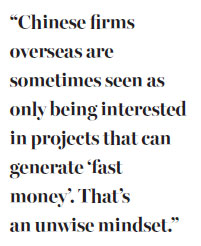Companies can learn from Huawei
Updated: 2016-11-04 07:22
By Ning Jiajun(China Daily Europe)
|
|||||||||
Listening to clients carefully and joining with partners is Chinese IT giant's recipe for European success
The 14-port and 3D hexagonal beam antennas Huawei recently unveiled at the 5th Annual Global Antenna and Active Antenna Unit Forum in Paris have grabbed industry attention, especially in Europe.
The products, featured in multi-low-band deployments, as well as multi-multiplex and multi-sector deployments, are instrumental in addressing the challenges of the 4.5G and 5G era.
Zhang Jiayi, president of Huawei's Antenna Business Unit, told the forum: "Huawei always focuses on satisfying the requirements of operators in the mobile broadband era."
As an IT giant in China, Huawei has made impressive achievements globally during the past few years. Its success in Europe is especially welcome, given that the continent was the cradle of time-honored competitors, such as Nokia and Ericsson.
What's more, Huawei's experience is testimony to Laffont's Theory of Competition in Telecommunications - that industrial guidance and regulation can draw inspiration of any sort.
Compared with infrastructural sectors such as highway and port construction, telecommunications is more demanding of technology renewal. It also has a longer industrial chain than the petrochemical sector, even though the end consumers of both are very price-sensitive.

Intellectual property barriers are more commonly seen in telecommunications than in other emerging sectors, due to its long history and monopolies. Therefore, studying Huawei's success in Western Europe - not just its high-tech projects - would have far-reaching impacts.
What can we learn from Huawei's global strategy? Leading innovating companies in China have become a major focus within the IT industry. The country is looking forward to exporting a greater number of high-tech products and leveling the field of competitiveness. Therefore, the responsibility for going global has fallen on firms like Huawei, as China shifts its economy toward technology and innovation.
Huawei's global development was never easy. Strategically speaking, it's a game played not only between companies or sectors but also one that puts innovation and collective merits to the test.
In addition to its Chinese roots, Huawei also has to thank its managers' smart calls, their openness and doggedness, as well as its employees' hard work for its success.
Looking back more than a decade, Huawei was facing pressing challenges and had to struggle for survival. Its path toward globalization has enabled us to learn tremendously.
What's especially worth noting is its strategic positioning and openness. Huawei has been following three strategies - focus, integration and openness. Xu Wenwei, Huawei's chief of strategy and marketing, as well as its European head, said several times that the company has adopted a partnership strategy in Europe. In addition to teaming up with SAP and Imperial College London, it also works with partners including Alstom and British Telecom as it seeks to improve its products and services and introduce additional value.
Listening to clients' demands carefully and joining with partners is Huawei's recipe for its success in Europe, as Xu Wenwei has pointed out, and the way it will retain its technological edge.
The company is also active in fulfilling its social responsibilities and integrating into local society.
Chinese firms overseas are sometimes seen as only being interested in projects that can generate "fast money". That's an unwise mindset.
Intangible assets, including brand recognition and reputation, should be given the highest priority. Chinese peers have a lot to learn from Huawei on that score.
Huawei has climbed from 88th to 72nd on Interbrand's 2016 Best Global Brands ranking, making it one of the fastest risers in the technology sector.
Its brand value increased 18 percent year-on-year to $5.84 billion, a result of its brand-building efforts. Brand recognition can bring value in a real sense, as companies will have more room in pricing, and it also serves as protection in times of crisis.
Reputation and brand are intertwined. A good reputation is the basis for a good brand, while a good brand can bring a good reputation. Huawei's knowledge of how to cultivate its reputation is one of the reasons for its worldwide recognition.
The biggest distinction setting Huawei apart from its peers is how it lives out its globalization strategy.
The author is director of the Experts Committee at the State Information Center. The views do not necessarily reflect those of China Daily.
(China Daily European Weekly 11/04/2016 page8)
Today's Top News
Li promotes SCO bank, free trade
High Court: Parliament must vote before Brexit
Court to instruct how to trigger formal EU exit
Premier emphasizes fight against terror
Italian authorities vow to rebuild earthquake-hit areas
Li arrives in Kyrgyzstan for visit, SCO meeting
Xi affirms one-China policy
France to begin moving migrant minors from Calais
Hot Topics
Lunar probe , China growth forecasts, Emission rules get tougher, China seen through 'colored lens', International board,
Editor's Picks

|

|

|

|

|

|







